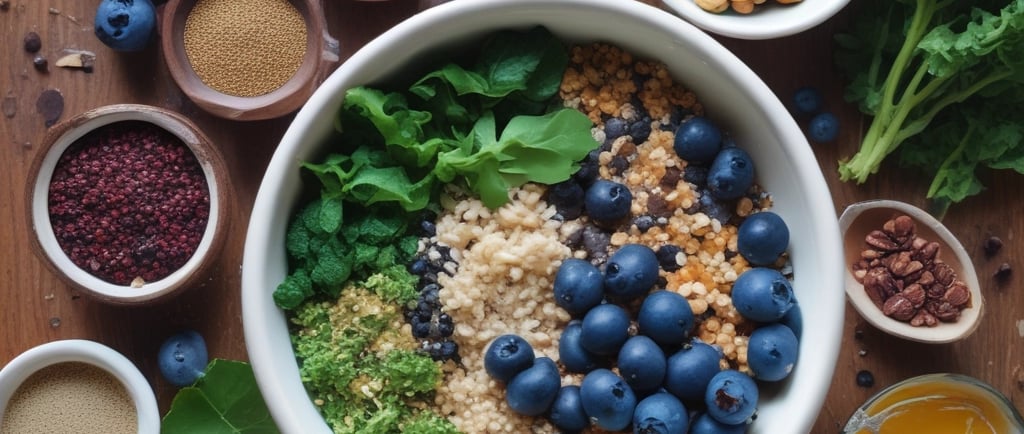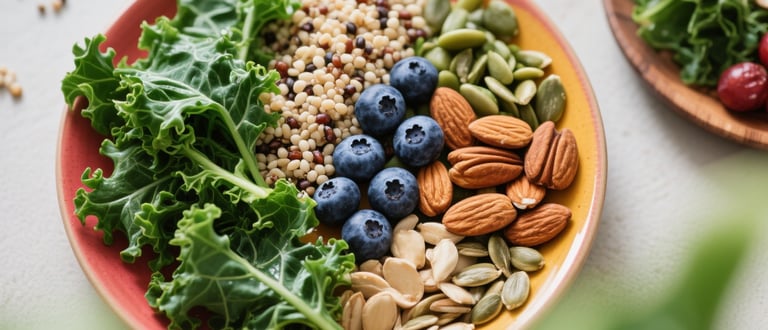
The Truth About Superfoods: What They Actually Do for Your Body
NUTRITIONDIET
9/25/20254 min read


Understanding Superfoods: A Definition and Overview
Superfoods are commonly defined as foods that are exceptionally nutrient-dense and beneficial for health and well-being. They are often rich in vitamins, minerals, antioxidants, and other bioactive compounds that can contribute to improved health outcomes. The term "superfood" has gained popularity in recent years, often associated with foods that offer unique health benefits beyond those of regular foods.
To be classified as a superfood, a food item typically must possess a high level of nutritional density, meaning that it provides a significant amount of essential nutrients relative to its caloric content. Common examples of such foods include berries, leafy greens, nuts, and seeds, all of which are packed with nutrients that can help combat various health issues. Their rich nutritional profile often allows them to play a pivotal role in disease prevention and health promotion.
Antioxidant properties are another notable characteristic of superfoods. These compounds help neutralize harmful free radicals in the body, which can reduce oxidative stress and lower the risk of chronic diseases such as cancer and heart disease. Examples of superfoods abundant in antioxidants include blueberries, dark chocolate, and green tea, which are frequently highlighted for their ability to support overall health.
The origins of the term "superfood" can be traced back to marketing efforts aimed at promoting certain foods believed to be particularly beneficial. This has led to some debate about the legitimacy of the term, as it can sometimes be overused or misapplied to foods that may not meet the rigorous definitions of superfoods. Nonetheless, the popularity of superfoods continues to influence public perception and dietary choices, with many individuals seeking to incorporate these nutrient-rich foods into their daily diets to enhance health and vitality.
The Nutritional Benefits of Superfoods
Superfoods are often celebrated for their exceptional nutritional profiles, which can provide numerous health benefits when incorporated into a balanced diet. These foods are rich in essential vitamins, minerals, and phytonutrients that can significantly contribute to overall health and well-being. For instance, quinoa, a complete protein source, contains all nine essential amino acids and is rich in B vitamins, magnesium, and iron. This nutrient density makes quinoa an excellent choice for vegetarians and those looking to enhance their dietary protein intake.
Kale, another notable superfood, is packed with vitamins K, A, and C, as well as antioxidants such as flavonoids and isothiocyanates. These compounds have been linked to reduced inflammation, improved heart health, and lower risks of chronic diseases. The high fiber content of kale also supports digestive health, making it a versatile addition to various meals, from salads to smoothies.
Blueberries are frequently highlighted for their extraordinary antioxidant properties. Rich in vitamin C, vitamin K, and dietary fiber, they have been shown to bolster the immune system and promote heart health. Studies indicate that the anthocyanins found in blueberries may aid in improving cognitive function and reducing the risk of neurodegenerative diseases. By incorporating a variety of superfoods into daily nutrition, individuals can enjoy a rich array of health benefits that promote longevity and reduce the risk of chronic illness.
Incorporating these superfoods into one's diet presents an effective strategy for enhancing nutrient intake. Their unique compositions not only provide necessary vitamins and minerals but also contribute to sustaining energy levels and improving overall quality of life. The diversity of superfoods allows for delicious versatility, ensuring that individuals can enjoy both their health benefits and appealing flavor without monotony.
Debunking Myths: What Superfoods Can't Do
Superfoods have gained significant attention in recent years, often being marketed as miraculous solutions to a host of health issues. However, it is crucial to debunk the most common myths surrounding these foods. One prevalent misconception is that superfoods can replace a balanced diet. While certain foods, such as quinoa, kale, or blueberries, are nutrient-dense, they should not be viewed as standalone solutions for achieving optimal health. A well-rounded diet that includes a variety of food groups is essential for providing the necessary nutrients our bodies require.
Another myth that often circulates is the idea that superfoods can serve as a miracle cure for ailments. Many individuals tend to turn to these foods in hopes of solving chronic health conditions or achieving quick fixes to their nutritional deficiencies. However, relying solely on a specific 'superfood' does not address the complexities of diet and health. The concept of any single food remedying health issues oversimplifies the reality of nutrition. Instead, a holistic approach that considers lifestyle factors, such as exercise, sleep, and stress management, plays a far more significant role in an individual’s health outcomes.
Furthermore, it is essential to recognize that superfoods can often be overhyped. Media and marketing can exaggerate claims about their benefits, leading consumers to develop unrealistic expectations. It is advisable to approach superfood claims with a critical eye, acknowledging that while these foods may contribute positively to one's diet, they should be part of a broader nutritional strategy. A diverse and balanced diet, rich in fruits, vegetables, whole grains, and proteins, remains fundamental for long-term health. Ultimately, there is no 'one-size-fits-all' solution when it comes to nutrition, and understanding the limitations of superfoods can lead to more informed dietary choices.
Incorporating Superfoods into Your Diet: Practical Tips
Incorporating superfoods into your diet can be a straightforward yet rewarding endeavor. To begin with, it is essential to identify which superfoods resonate with your tastes and nutritional needs. Common superfoods include blueberries, kale, quinoa, and chia seeds. These nutrient-dense options can easily be added to various meals, offering versatility in preparation.
One effective way to include superfoods is through meal planning. Dedicate time each week to plan your meals, selecting specific days to focus on recipes that highlight these ingredients. For instance, consider making a hearty quinoa salad packed with leafy greens, colorful vegetables, and a sprinkle of nuts for extra flavor and texture. Smoothies are also an excellent avenue for incorporating superfoods; blending spinach or kale with fruits such as bananas or berries provides a delicious start to your day while maximizing nutrient intake.
In addition to recipes, sourcing superfoods sustainably is critical. Opt for local farmers' markets or community-supported agriculture (CSA) programs, which promote fresh, seasonal produce while supporting the local economy. Furthermore, when purchasing packaged superfoods, always check for certifications that indicate sustainable farming practices or non-GMO status.
Enhancing the flavor of superfoods can also encourage regular consumption. Experiment with spices and herbs, such as ginger, garlic, or turmeric, to complement dishes featuring superfoods. These additions not only elevate taste but also introduce additional health benefits. Moreover, integrating superfoods into snacks can be seamless; for example, combining chia seeds with yogurt or oatmeal creates a fulfilling, nutritious treat.
By taking small but deliberate steps, you can enrich your diet with superfoods, bringing a wealth of health benefits without the need for drastic dietary changes. Focus on gradual integration, and allow yourself to explore the diverse culinary possibilities these potent foods offer.








